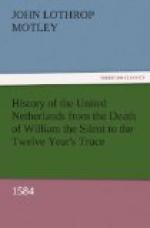It was decreed that no motion of agreement “with the tyrant of Spain” should be entertained either publicly or privately, “under pain to be reputed ill patriots.” It was also enacted in the city of Dort that any man that brought letter or message from the enemy to any private person “should be forthwith hanged.” This was expeditious and business-like. The same city likewise took the lead in recording its determination by public act, and proclaiming it by sound of trumpet, “to live and die in the cause now undertaken.”
In Flanders and Brabant the spirit was less noble. Those Provinces were nearly lost already. Bruges seconded Parma’s efforts to induce its sister-city Ghent to imitate its own baseness in surrendering without a struggle; and that powerful, turbulent, but most anarchical little commonwealth was but too ready to listen to the voice of the tempter. “The ducats of Spain, Madam, are trotting about in such fashion,” wrote envoy Des Pruneaux to Catherine de Medici, “that they have vanquished a great quantity of courages. Your Majesties, too, must employ money if you wish to advance one step.” No man knew better than Parma how to employ such golden rhetoric to win back a wavering rebel to his loyalty, but he was not always provided with a sufficient store of those practical arguments.
He was, moreover, not strong in the field, although he was far superior to the States at this contingency. He had, besides his garrisons, something above 18,000 men. The Provinces had hardly 3000 foot and 2500 horse, and these were mostly lying in the neighbourhood of Zutphen. Alexander was threatening at the same time Ghent, Dendermonde, Mechlin, Brussels, and Antwerp. These five powerful cities lie in a narrow circle, at distances varying from six miles to thirty, and are, as it were, strung together upon the Scheldt, by which river, or its tributary, the Senne, they are all threaded. It would have been impossible for Parma, with 100,000 men at his back, to undertake a regular and simultaneous siege of these important places. His purpose was to isolate them from each other and from the rest of the country, by obtaining the control of the great river, and so to reduce them by famine. The scheme was a masterly one, but even the consummate ability of Farnese would have proved inadequate to the undertaking, had not the preliminary assassination of Orange made the task comparatively easy. Treason, faint-heartedness, jealousy, were the fatal allies that the Governor-General had reckoned upon, and with reason, in the council-rooms of these cities. The terms he offered were liberal. Pardon, permission for soldiers to retreat with technical honour, liberty to choose between apostacy to the reformed religion or exile, with a period of two years granted to the conscientious for the winding up of their affairs; these were the conditions, which seemed flattering, now that the well-known voice which had so often silenced the Flemish palterers and intriguers was for ever hushed.




